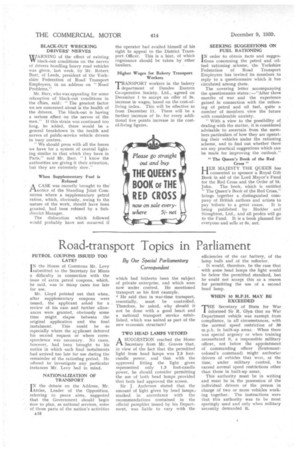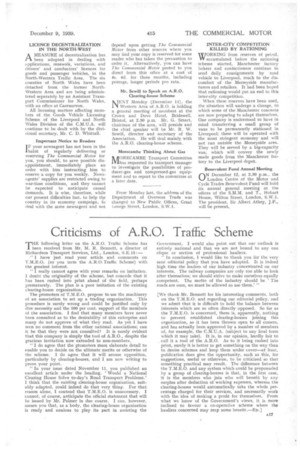Road-transport Topics in Parliament
Page 18

Page 19

If you've noticed an error in this article please click here to report it so we can fix it.
By Our Special Parliamentary Correspondent PETROL COUPONS ISSUED TOO IN the House of Commons Mr. Levy submitted to the Secretary for Mines a difficulty in connection with the issue of extra petrol coupons, which, he said, was in many cases too late for use.
Mr. Lloyd pointed out that when, after supplementary coupons were issued, the applicant asked for a review of his case and further allowances were granted, obviously some time might elapse between the original application and the final instalment. This could be so especially where the arplicant deferred his second request or where correspondence was necessary. No cases, however, had been brought to his notice in which such final instalments had arrived too late for use during the remainder of the rationing period. He offered to investigate any. particular instances Mr. Levy had in mind.
NATIONALIZATION OF TRANSPORT
IN the debate on the Address, Mr. Attlee, Leader of the Opposition, referring to peace aims, suggested that the Government should begin now to plan, as national services, some ' of those parts of the nation's activities
16 which had hitherto been the subject of private enterprise, and which were now under control. He mentioned transport as his first example.
• He said that in war-time transport, essentially, must be controlled. Therefore, he asked, why should it not be done with a good heart and a national transport service established, which was united as part of the new economic structure?
TWO HEAD LAMPS VETOED
ASUGGESTION reached the Home Secretary from Mr. Groves that, in view of the fact that the permitted light from head lamps was 2.5 footcandle power, and that with the approved fitting the light given represented only 1.3 foot-candle power, he should consider permitting the use of both head lamps provided that both had approved the screen,
Sir J. Anderson stated that the amount of light given by head lamps,. masked in accordance with the recommendations contained in the official pamphlet issued by his Department, was liable to vary with the efficiencies of the car battery, of the lamp bulb and of the reflector.
It would, therefore, be the case that with some head lamps the light would be below the permitted standard, but he could not accept this as a reason for permitting the use of a second head lamp.
WHEN 30 M.P.H. MAY BE EXCEEDED THE Secretary of State for War 1 informed Sir R. Glyn that no War Department vehicle was exempt from compliance, in all circumstances, with the normal speed restriction of 30 m.p.h. in built-up areas. When there was special urgency or when training necessitated it, a responsible military officer„ not below the appointment of commanding officer (lieutenantcolonel's command) might authorize drivers of vehicles that were, at the time, under military control, to exceed normal speed restrictions other than those in built-up areas.
This authority must be in writing and must be in the possession of the individual drivers or the person in charge of two or more vehicles working together. The instructions were that this authority was to be most sparingly used and only when military necessity demanded it. LICENCE DECENTRALIZATION IN THE NORTH-WEST
• A MEASURE of decentralization has
been adopted in dealing with applications, renewals, variations, and drivers' and conductors' licences for goods and passenger vehicles, in the North-Western Traffic Area. The six counties of North Wales have been detached from the former NorthWestern Area and are being administered separately by an Assistant Transport Commissioner for North Wales, with an office at Caernarvon.
All licensing matters affecting members of the Goods Vehicle Licensing Scheme of the Liverpool and North Wales Division of the C.M.U.A. will continue to be dealt with by the divisional secretary, Mr. C. D. Whittall.
Important Notice to Readers IF your newsagent has not been in the 'habit of regularly delivering or reserving The Commercial Motor for you, you should, to save possible disappointment, immediately place an order with him instructing him to reserve a copy for you weekly. Newsagents' supplies are restricted owing to war-time conditions, and they cannot be expected to anticipate casual demands. It is wise, therefore, while our present difficulties last, to help the country in its economy campaign, to deal with the same newsagent and not depend upon getting The Commercial Motor from other sources where you may find your copy is reserved for some reader who has taken the precaution to order it. Alternatively, you can have The Commercial Motor posted to you direct from this office at a cost of 4s. 4d. for three months, including postage, longer periods pro rata.
Mr. Sewill to Speak on A.R.CI. Clearing-house Scheme MEXT Monday (pecember 11), the I. Western Area of A.R.O. is holding a general meeting of members at the Crown and Dove Hotel, Bridewell, Bristol, at 2.30 p.m. Mr. G. Smart, chairman of the area, will preside and the chief speaker will be Mr. R. W. Sewill, director and secretary of the Association. He will deal mainly with the A.R.O. clearing-house scheme.
Morecambe Thinking About Gas
MORECAMBE Transport Committee Mims requested its transport manager to investigate the possibilities of producer-gas and compressed-gas equipment and to report to the committee at a later date.
From Monday last, the address of the Depir_tment of Overseas Trade was changed to New Public Offices, Great George Street. London, S.W.I. INTER-CITY COMPETITION • KILLED BY RATIONING WORKING from reserves of petrol, W accumulated before the rationing scheme started, Manchester factory bakers and confectioners continue to send daily consignments by road vehicle to Liverpool, much to the discomfort of the Merseyside manufacturers and retailers. It had been hoped that rationing would put an end to this inter-city competition.
• When these reserves have been used, the situation will undergo a change, to Which some of the Manchester concerns are now preparing to adapt themselves. One company is understood to have in mind transferring a small group of vans to be permanently stationed in Liverpool; these will be operated with the most stringent economy and will not run outside the Merseyside area. They will be served by a big-capacity van, which will convey the newly made goods from the Manchester factory to the Liverpool depot.
Benevolent Fund Annual Meeting
ON December 12, at 2.30 p.m., the London Centre of the Motor and Cycle Trades Benevolent Fund will hold its annual general meeting at the offices of the S.M.M. and T., Hobart House, Wilton Street, London, S.W.1. The president, Sir Albert Atkey, J.P., will be present.,




















































